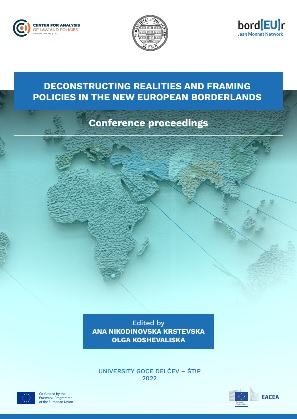
Автори/Уредници:
Ana Nikodinovska Krstevska and Olga Koshevaliska
Издавач:
University Goce Delchev – Shtip
Година: 2022
ISBN 978-608-244-978-4
Краток приказ:
This book is the second publication delivered within the Jean Monnet Network Project ‘BordEUr: New European Borderlands’, born within the context of the past experiences of Jean Monnet activities carried out by the Central European University (Hungary), and involving other eight partner universities form different European countries: University Goce Delčev-Štip (North Macedonia), Middle East Techincal University (Turkey), South-East European Research Center of the CITY College, University of York Europe Campus in Thessaloniki (Greece), University of Sheffield (United Kingdom), University Pompeu Fabra (Spain), University of Vienna (Austria), ‘Alma Mater Studiorum’ - University of Bologna (Italy), the University of National and World Economy in Sofia (Bulgaria).
The aim of the BordEUr project is to document and assess the proliferation of new borders in the aftermath of the European Union’s (EU) recent crises (the Eurozone crisis, the so-called migration crisis, and the COVID-19 pandemic), which in various ways, were crises of the EU borders itself. Specifically, through the focus on (re)emerging borders, the project sought to address the pressing challenges that the EU is facing in its border control practices as well as in its self-representation as an international actor. Through different case studies studied during the project duration, the research team analyzed the symbolic role of borders in the EU and Member States narratives, outlining new approaches to bordering policies and bordering practices in the neighborhood.
One of the project activities where the results of the research were shared in itinere, was the international conference hosted by the University Goce Delčev in Štip, under the direction of prof. Ana Nikodinovska Krstevska and prof. Olga Koshevaliska in December 2021. The conference entitled ‘Deconstructing realities and framing policies in the new European borderlands’, which took place online due to the limitations of COVID – 19 pandemics, saw the participation of most of the project partners, presenting their research and results, and opening the path for further fruitful discussion on that matter. In fact, this publication contains some of the proceedings of the BordEUr conference held at the University Goce Delčev – Štip.
Specifically, Stefano Bianchini, Silvia Cittadini and Marco Zoppi in their paper In-Securitization through externalization? The EU and Western Balkans ‘Borderlands’, provide insights and analysis regarding the making and re-making of borders in the Western Balkans, in the aftermath of the migration dynamics of 2015. In a similar stance, Ana Nikodinovska Krstevska and Olga Koshevaliska in their contribution EU and North Macedonia: Establishing new bordering practices in asylum and migration, tackle the solidarity crisis of the EU in relation to the migration influx and how this crisis pressed for externalization of EU’s asylum and migration policies in the Western Balkans. Going round on the other side of the Adriatic coast, Michela Ceccorulli in her summary The implications of bordering practices in relations between Italy and the EU, exemplifies how the different crisis have impacted upon Italy’s bordering processes and have pushed for the adoption of a narration of overlapping the border of the EU with the Southern border of Libya. Returning to the Balkan route, Petros Golitsis and Alexandra Prodromidou in their paper Mapping migration and integration tendencies in Greece and their impact on bordering practices, present and analyze immigration related statistics for the case of Greece, shedding light on the current migration related practice and policy within the EU and Greece, with a particular focus on the Greek-Bulgarian cooperation and the Greek-Turkish tension. Looking at borders from the perspective of the United Kingdom, Owen Parker in his summary EU citizens, free movement and ontological (in)security in the United Kingdom: Beyond national citizens and post-national entrepreneurs?, outlines UK’s securitizing narrative towards EU citizens conceived as an ontological security threat to UK citizens, and, gives evidence that the economic benefits from EU citizens were wrongfully perceived by the public, being issues that were securitized by certain elites and certain media. András Szalai in his contribution The border as a symbolic resource in populist crisis narratives: Lessons from Hungary, focuses primarily on political discourses, and illustrates the symbolic role of borders in terms of a dilemma that the Hungarian government led by Orbán is facing, outlining that securitization of borders in the Hungarian case is not the result of imposing greater control on borders, rather about maintaining a state of crisis for political mobilization and policy justification within the country, and about enacting state sovereignty on the European level. Finally, Ricard Zapata-Barrero in his case study Debordering processes and resilient ontological security at the city level: The case study of Barcelona in perspective, brings the question of ontological security on a city level, and he explores through a conceptual and empirical framework the connection between the two heuristic approaches withing migration studies, that is ontological security and urban resilience.

